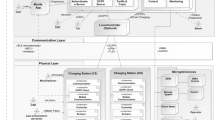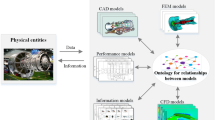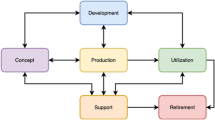Abstract
In embedded systems, there is a clear movement from autonomous systems towards collaborative systems, forming so-called collaborative system groups (CSGs), which collaborate to achieve common goals. Verification of CSGs, however, imposes new challenges, which are difficult to address with traditional verification techniques. In the following, we investigate the use of strategic logics for the analysis of CSGs, by means of a use-case in the domain of smart production systems. Our results show that strategic model checking is useful to investigate certain aspects of CSGs, such as the impact of environmental changes. However, our results also show some limitations of the approach, when it comes to the analysis of implementation-level aspects, such as performance. Thus, we conclude that strategic model checking might complement existing approaches for the analysis of CSGs.





Similar content being viewed by others
Notes
The tool is available online and can be downloaded at https://github.com/blackbat13/ATLFormulaChecker.
References
Ågotnes T (2004) A note on syntactic characterization of incomplete information in ATEL. In: Proceedings of workshop on knowledge and games, pp 34–42
Ågotnes T, Goranko V, Jamroga W, Wooldridge M (2015) Knowledge and ability. In: van Ditmarsch H, Halpern J, van der Hoek W, Kooi B (eds) Handbook of epistemic logic. College Publications, New York
Alur R, de Alfaro L, Grossu R, Henzinger T, Kang M, Kirsch C, Majumdar R, Mang F, Wang BY (2001) jMocha: a model-checking tool that exploits design structure. In: Proceedings of international conference on software engineering (ICSE), pp 835–836. IEEE Computer Society Press
Alur R, Henzinger TA, Kupferman O (1997) Alternating-time temporal logic. In: Proceedings of the 38th annual symposium on foundations of computer science (FOCS), pp 100–109. IEEE Computer Society Press
Alur R, Henzinger TA, Kupferman O (2002) Alternating-time temporal logic. J ACM 49:672–713. https://doi.org/10.1145/585265.585270
Bulling N, Dix J, Jamroga W (2010) Model checking logics of strategic ability: complexity. In: Dastani M, Hindriks K, Meyer JJ (eds) Specification and verification of multi-agent systems. Springer, Berlin
Bulling N, Goranko V, Jamroga W (2015) Logics for reasoning about strategic abilities in multi-player games. In: van Benthem J, Ghosh S, Verbrugge R (eds) Models of strategic reasoning. Springer, Berlin, pp 93–136
Bulling N, Jamroga W (2014) Comparing variants of strategic ability: how uncertainty and memory influence general properties of games. J Auton Agents Multi Agent Syst 28(3):474–518
Busard S, Pecheur C, Qu H, Raimondi F (2014) Improving the model checking of strategies under partial observability and fairness constraints. In: Formal methods and software engineering, lecture notes in computer science, vol 8829, pp 27–42. Springer. https://doi.org/10.1007/978-3-319-11737-9_3
Busard S, Pecheur C, Qu H, Raimondi F (2015) Reasoning about memoryless strategies under partial observability and unconditional fairness constraints. Inf Comput 242:128–156. https://doi.org/10.1016/j.ic.2015.03.014
Clarke EM, Emerson EA, Sistla AP (1986) Automatic verification of finite-state concurrent systems using temporal logic specifications. ACM Trans Program Lang Syst 8(2):244–263. https://doi.org/10.1145/5397.5399
Dias M, Zlot R, Kalra N, Stentz A (2006) Market-based multirobot coordination: a survey and analysis. Proc IEEE 94(7):1257–1270. https://doi.org/10.1109/JPROC.2006.876939
Dima C, Enea C, Guelev D (2010) Model-checking an alternating-time temporal logic with knowledge, imperfect information, perfect recall and communicating coalitions. In: Proceedings of games, automata, logics and formal verification (GandALF), pp 103–117
Dima C, Tiplea F (2011) Model-checking ATL under imperfect information and perfect recall semantics is undecidable. CoRR abs/1102.4225
Gammie P, Meyden R (2004) MCK model checking the logic of knowledge. In: Proceedings of the 16th international conference on computer aided verification (CAV’04), LNCS, vol 3114, pp 479–483. Springer
Guelev D, Dima C (2012) Epistemic ATL with perfect recall, past and strategy contexts. In: Proceedings of computational logic in multi-agent systems (CLIMA), lecture notes in computer science, vol 7486, pp 77–93. Springer. https://doi.org/10.1007/978-3-642-32897-8_7
Guelev D, Dima C, Enea C (2011) An alternating-time temporal logic with knowledge, perfect recall and past: axiomatisation and model-checking. J Appl Non Class Logics 21(1):93–131
Huang X, van der Meyden R (2014) Symbolic model checking epistemic strategy logic. In: Proceedings of AAAI conference on artificial intelligence, pp 1426–1432
Jamroga W (2015) Logical methods for specification and verification of multi-agent systems. ICS PAS Publishing House, Manila
Jamroga W, van der Hoek W (2004) Agents that know how to play. Fundam Inform 63(2–3):185–219
Jamroga W, Knapik M, Kurpiewski D(2017) Fixpoint approximation of strategic abilities under imperfect information. In: Proceedings of the 16th international conference on autonomous agents and multiagent systems (AAMAS), pp 1241–1249. IFAAMAS
Jamroga W, Knapik M, Kurpiewski D (2018) Model checking the selene e-voting protocol in multi-agent logics. In: Proceedings of the 3rd international joint conference on electronic voting (E-VOTE-ID), lecture notes in computer science, Springer. To appear
Jamroga W, Knapik M, Kurpiewski D, Mikulski Ł (2018) Approximate verification of strategic abilities under imperfect information. Artificial intelligence, To appear
Koenig S, Keskinocak P, Tovey CA (2010) Progress on agent coordination with cooperative auctions. In: Proceedings of the twenty-fourth AAAI conference on artificial intelligence, AAAI 2010, Atlanta, Georgia, USA, July 11–15, 2010
Lagoudakis M, Markakis V, Kempe D, Keskinocak P, Koenig S, Kleywegt A, Tovey C, Meyerson A, Jain S (2005) Auction-based multi-robot routing. In: Proceedings of the international conference on robotics: science and systems, pp 343–350
Lomuscio A, Qu H, Raimondi F (2015) MCMAS: an open-source model checker for the verification of multi-agent systems. Int J Softw Tools Technol Transf. https://doi.org/10.1007/s10009-015-0378-x Availabe online
Manyika J, Chui M, Bisson P, Woetzel J, Dobbs R, Bughin J, Aharon D (2015) The internet of things: mapping the value beyond the hype. https://web.archive.org/web/20180726101247/https://www.mckinsey.com/~/media/McKinsey/Business
Motavalli J (2010) The dozens of computers that make modern cars go (and stop). https://web.archive.org/web/20180726104858/https://www.nytimes.com/2010/02/05/technology/05electronics.html
Pilecki J, Bednarczyk M, Jamroga W (2014) Synthesis and verification of uniform strategies for multi-agent systems. In: Proceedings of CLIMA XV, lecture notes in computer science, vol 8624, pp 166–182. Springer
Rajkumar R, Lee I, Sha L, Stankovic J (2010) Cyber–physical systems: the next computing revolution. In: Design automation conference (DAC), 2010 47th ACM/IEEE, pp 731–736. IEEE
Sandholm TW (1999) Distributed rational decision making. In: Weiss G (ed) Multiagent systems: a modern approach to distributed artificial intelligence. The MIT Press, Cambridge, pp 201–258
Schlingloff B (2018) Specification and verification of collaborative transport robots. In: 4th international workshop on emerging ideas and trends in the engineering of cyber–physical systems, EITEC@CPSWeek 2018, 10 April 2018, Porto, Portugal, pp 3–8. IEEE Computer Society. https://doi.org/10.1109/EITEC.2018.00006
Schlingloff B, Stubert H, Jamroga W (2016) Collaborative embedded systems—a case study. In: 3rd international workshop on emerging ideas and trends in engineering of cyber–physical systems, EITEC@CPSWeek, pp 17–22. https://doi.org/10.1109/EITEC.2016.7503691
Schlingloff BH, Stubert H, Jamroga W (2016) Collaborative embedded systems—a case study. In: 2016 3rd international workshop on Emerging ideas and trends in engineering of cyber–physical systems (EITEC), pp 17–22. IEEE
Schobbens PY (2004) Alternating-time logic with imperfect recall. Electron Notes Theor Computer Sci 85(2):82–93
Shoham Y, Leyton-Brown K (2009) Multiagent systems—algorithmic, game-theoretic, and logical foundations. Cambridge University Press, Cambridge
van der Hoek W, Lomuscio A, Wooldridge M (2006) On the complexity of practical ATL model checking. In: Proceedings of international joint conference on autonomous agents and multiagent systems (AAMAS), pp 201–208. ACM
van der Meyden R (2017) Optimizing epistemic model checking using conditional independence. In: Proceedings of theoretical aspects of rationality and knowledge, pp 398–414
Weiss G (ed) (1999) Multiagent systems. A modern approach to distributed artificial intelligence. MIT Press, Cambridge
Wooldridge M (2002) An introduction to multi agent systems. Wiley, Amsterdam
Acknowledgements
The authors acknowledge the support of the National Centre for Research and Development (NCBR), Poland, under the PolLux Project VoteVerif (POLLUX-IV/1/2016). We also thank Wojtek Jamroga for assistance with the related work section.
Author information
Authors and Affiliations
Corresponding author
Rights and permissions
About this article
Cite this article
Kurpiewski, D., Marmsoler, D. Strategic logics for collaborative embedded systems. SICS Softw.-Inensiv. Cyber-Phys. Syst. 34, 201–212 (2019). https://doi.org/10.1007/s00450-019-00424-7
Published:
Issue Date:
DOI: https://doi.org/10.1007/s00450-019-00424-7




